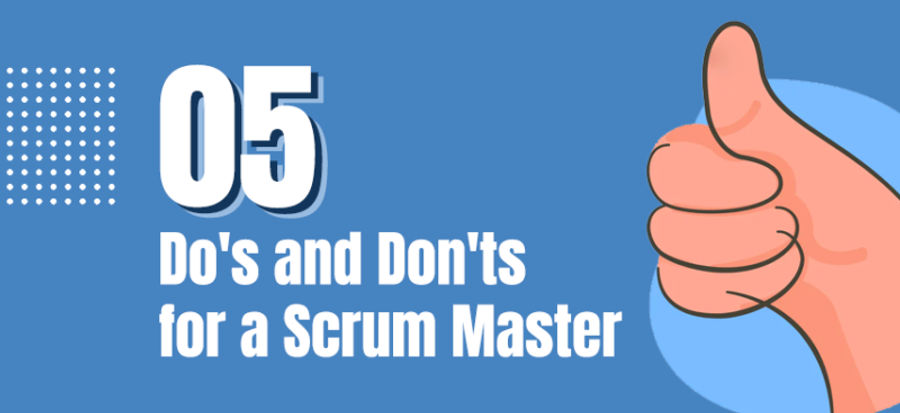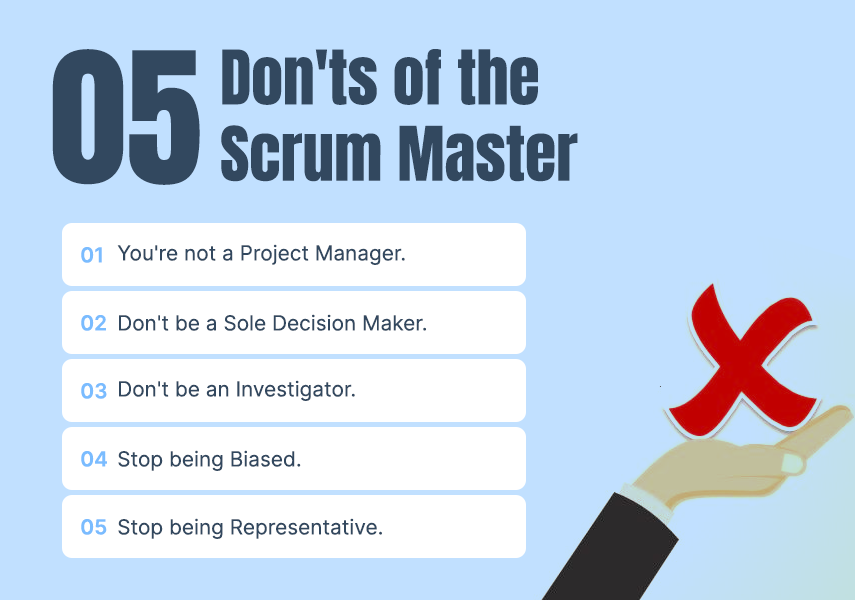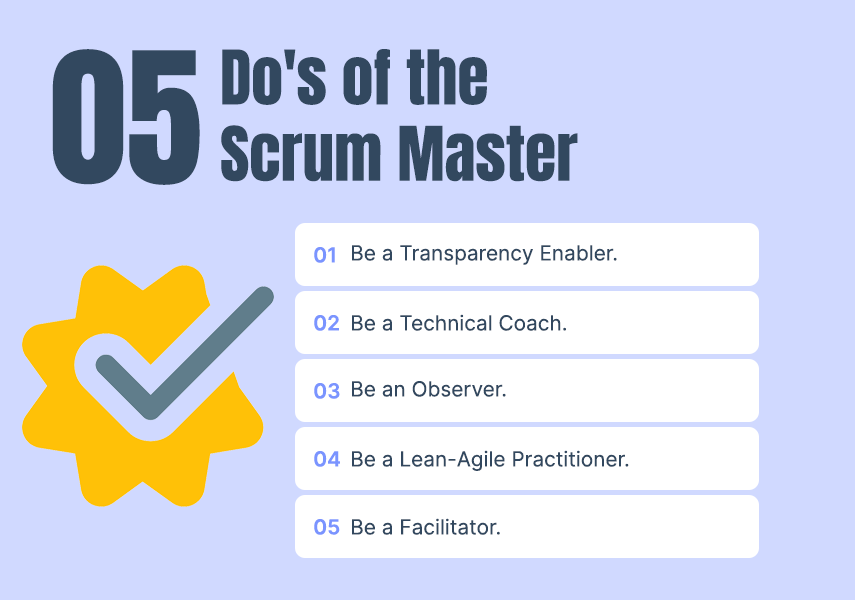
- Naveen Kumar Singh
- Dec 23rd 2020
Do you want to be an effective Scrum Master? I am sharing some do's and don'ts which you must keep in mind while playing the role of the Scrum Master. Let's dive into it quickly.
Who is a Scrum Master?
The scrum master is the one who upholds the scrum understanding in the team and practices agility. They ensure the Scrum team is effectively developing products by the following empiricism. Coaching, teaching, mentoring, and facilitation are useful tools for the Scrum Master. They are making sure that every team member must understand the product goal and purpose of developing the product. From devising Scrum to facilitating scrum meetings, the scrum master is a crucial role within the Scrum Framework. Moreover, it also ensures that the team must work at full productivity.Don'ts of the Scrum Master
1. You're not a Project Manager: No doubt, scrum masters are known for their eagle eyes as they have to observe the scrum team to identify dysfunctions and work on those. They are responsible for checking with those members whether they are doing the tasks or stuck due to impediments. The Scrum Master should not be confusing with the role of Project Manager. The scrum master's role is to take a different perspective from the team members and don't directly work as a taskmaster. They don't direct the team, collect status, compile reports, and share it with the stakeholders. They focus on enabling transparency and help the team practice empiricism.
2. Don’t be a Sole Decision Maker: Taking all the decisions all by yourself indeed gets you in trouble! Rather than coming up with conclusions all by yourself, I advised listening to others' views will help you get results. The scrum master must form a self-managed team and not making them dependent on the Scrum Master. Individually within the team can produce wonderful results, but collectively they do better always. Their opinion carries a lot more weight in the organization over the individual decision made by the Scrum Master.
3. Don’t be an Investigator: Continuously peeping into someone can be a bit annoying. Frequently keeping an eye on your scrum team can be a sin. Doing this degrades the position of scrum master. Giving the members their personal space to act to think will make them more efficient and independent as it can ruin relations and provide the scrum master the name of a lousy leader. So one should avoid checking up frequently. Avoiding this will result in better productivity, which is a benefit for both parties.
4. Stop being Biased: Scrum Masters should not take the side of any specific scrum team member. Scrum masters are known for being a facilitator in resolving conflict. They called as "FACILITATOR." At the time of any conflict, the scrum master should facilitate a conflict resolution meeting to identify the loophole or root cause of resolving the problem. It makes the scrum master a good leader.
5. Stop being Representative: Scrum Masters are not a development team representative, and the development team represents themselves wherever needed. Scrum Masters are also not a coordinator to co-ordinate dependencies between teams. The development teams should co-ordinate their dependencies.
Do's of the Scrum Master
Below we have listed down the best things the scrum master must do to make the team the fullest and yield the best results.
1. Be a Transparency Enabler: Scrum Master is considered a protector by many, and it is a bit exaggerated. Protecting doesn't mean that Scrum Master protects a team from demanding stakeholders. It is about helping everyone understand how an autonomous team produces a better result and enables transparency so that stakeholders don't see an urge to reach out to the team asking status, changing requirements, or progress reports. We need to understand the purpose of such a request and address it through transparency. Levelling stakeholders as bad people and the development team fully committed doesn't help anyone. Other than these scrum masters, they protect the team from complacency as continuous improvement helps produce the best outcome possible. They always make them feel that they still have a lot to learn.
2. Be a Technical Coach: A great scrum master could coach the team on engineering practices. It is not there in the Scrum Guide, and it is ok as Scrum Guide has changed a lot in the last decade to incorporate various other works that get done using Scrum. I always quote Bas Vodde's blog and Michael James's Scrum Master Checklist for the same. I hear many arguments about anyone can become a Scrum Master, and knowing technical practices are not required. But will you be hiring a badminton coach to help your kid in learning tennis? It is ok to take the role of Scrum Master without knowing these engineering practices but try learning those to help your team understand. Scrum Alliance and Scrum.org both have a good training program for the same, so better to attend Certified Scrum Developer or Professional Scrum Developer.
Find Our Upcoming Trainings
4. Be a Lean-Agile Practitioner: Change starts with you is a famous line but not easy to practice. We want everyone to be agile except ourselves. We, as Scrum Masters, expected to lead the change by being a role model. We need to embrace agile values and principles and apply system and lean thinking in decision making. Having experience with a few popular frameworks and practices helps in doing the job of a Scrum Master. Don't limit ourselves to a particular framework and be a lifelong learner.
5. Be a Facilitator: We all hear every day that Scrum Masters are facilitators and facilitate Scrum events and team decisions. How do they facilitate is something that matters more:
- We should know the difference between mediation, facilitation, and hosting meetings.
- They initiate the conversation with open-ended questions rather than leading questions to have fruitful discussion towards decision making.
- Structure to support dialogue and facilitation. In recent times, the liberating structure has gained popularity as it provides 33 micro-structure to facilitate team decisions.








